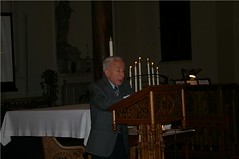Remembering the 70th anniversary of Kristallnacht
The 70th anniversary of Kristallnacht was memorialized in a remembrance service in St. Joseph’s Chapel on November 11.
“My father was sworn to oath not to talk about the camp he had been sent to. He hadn’t revealed to us until much later when we were in the United States,” said Ottenheimer.
By Tiffany Gilbert
Editorial Editor
The 70th anniversary of Kristallnacht was memorialized in a remembrance service in St. Joseph’s Chapel on November 11.
“My father was sworn to oath not to talk about the camp he had been sent to. He hadn’t revealed to us until much later when we were in the United States,” said Ottenheimer.
Ottenheimer was originally from Konstanz, Germany where he fled with his family in 1939 to the U.S. He later joined the U.S. army. “I have a better reason to fight against my country than they did. I saw the cruelty and hatred firsthand,” Ottenheimer said.
Kristallnacht is the “Night of Broken Glass,” which was the first event to initiate the Holocaust on November 9 and 10 of 1938. That night, 25,000 men were arrested and sent to concentration camps. Featured speaker, Fritz Ottenheimer’s own father was among them. He later returned, only to be lucky enough not to perish with the six million Jewish men, women, and children.
Other survivors in attendance were Robert Mendler, Shulamit Bastacky and Sam and Goldie Weinreb. Mendler spent six years in 10 different concentration camps and Sam Weinreb lost his parents, two brothers and a sister when he was 13. Bastacky was a hidden child, separated from her parents until her teens.
Six candles were lit in memory of the six million lost. The message presented during the service established a united community for “committing ourselves to responsibility for one another, to build on this earth a room that has no room for hatred, no place for violence.”
“It’s hard to believe it has been this long. I think about what could have happened to me. It has a strong, emotional effect on me,” said Ottenheimer. “If we had stayed there, we would have gotten killed.”
Seton Hill University’s Kristallnacht service “brings people together from all religions,” said Lois Sculco, administrator of the National Catholic Center for Holocaust Education (NCCHE). “People can learn about the Holocaust from lectures and studying facts, but this is a ritual and prayer toward a movement in history.”
“I think those who come to the Kristallnacht services they get an idea of the extent and vastness of the Holocaust but there is so much more,” said Gemma Del Duca, co-director of the NCCHE. “I believe it is because they have the opportunity to see, hear and shake hands with a survivor,” said Del Duca.
Ottenheimer is still very much involved with educating the importance of the Holocaust. Under the emotional scars, he continues to tell his story year after year bringing forth the attitude that “time does have a healing effect.”
